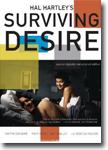 |
|
|||||||||||||||||||||||||||||||||||||||||||||||||||||||||||||
 I would love to be a fly on the wall at a Hal Hartley shoot. My guess is that his standard direction for an actor is, "Act like you're acting." There's a certain self-awareness of the medium that permeates much of what Hartley does, and that self-awareness, that meta-critical aloofness, is well and truly present in his 1991 film, Surviving Desire I would love to be a fly on the wall at a Hal Hartley shoot. My guess is that his standard direction for an actor is, "Act like you're acting." There's a certain self-awareness of the medium that permeates much of what Hartley does, and that self-awareness, that meta-critical aloofness, is well and truly present in his 1991 film, Surviving DesireJude, a college professor (Martin Donovan, a longtime collaborator of Hartley's, but now known for his role in Weeds Jude and Sofie are also stuck: they can't seem to get past the first kiss, which is repeated several times as well. The dialogue is extremely highfalutin', the acting deeply self-aware (the actors border on speaking in poetry-reading voices), yet Surviving Desire And so it has gone with Hartley. Surviving Desire The genre-bending doesn't always work, but it always serves what seems to be Hartley's main purpose in making films: to use art to critique popular culture. Henry Fool As an "art house indie" filmmaker, Hartley's work is bound to ebb and flow with the currents of commercialism, which factor into what makes money in the margins just as it does in the mainstream. But I think we can continue to count on Hartley to be idiosyncratic, intelligent, narratively dare-devilish, and somewhat underhanded and funny, even when it hurts. |
|
|||||||||||||||||||||||||||||||||||||||||||||||||||||||||||||
|
||||||||||||||||||||||||||||||||||||||||||||||||||||||||||||||
| action | animation | art house/international | comedy | documentary | drama | family | horror/sci-fi | suspense | television | ||||||||||||||||||||||||||||||||||||||||||||||||||||||||||||||
| contact | home | ||||||||||||||||||||||||||||||||||||||||||||||||||||||||||||||


